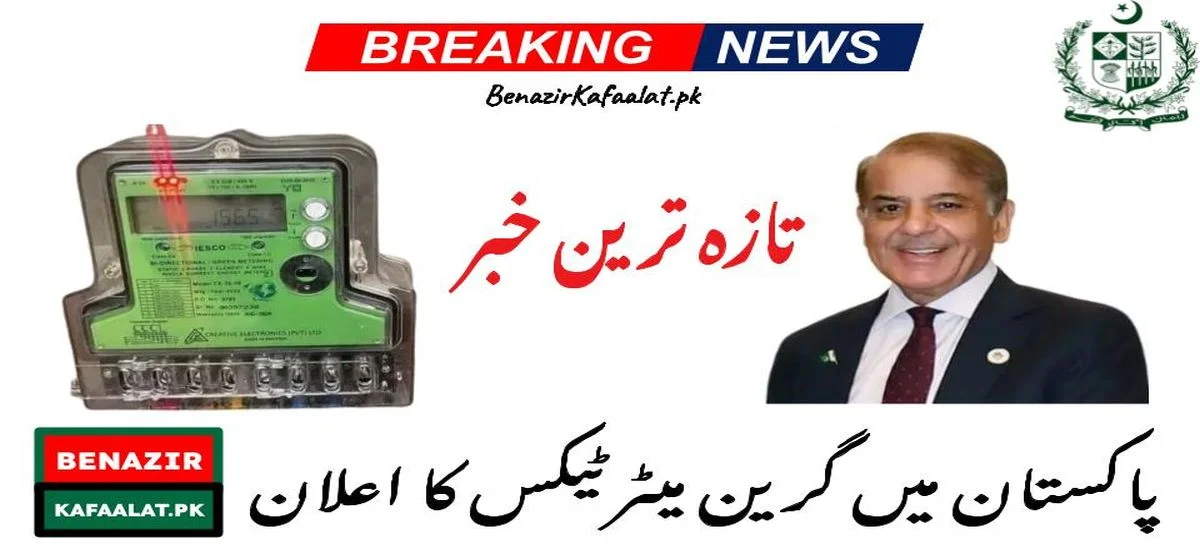Last Updated on: 30th July 2024, 06:32 am
The Government of Pakistan has announced the Green Meter Tax to encourage the use of renewable energy and energy-efficient appliances while reducing the over-consumption of non-renewable resources. This article examines the Green Meter Tax, its implications, benefits, and impact on Pakistan’s environmental and economic landscape.

What do you mean by the Green Meter Tax
The Green Meter Tax is a central part of Pakistan’s strategy to combat climate change and promote sustainable development. The aim of this tax is to reduce the carbon footprint and encourage the adoption of green technologies.
What is the aim of Green Meter Tax in Pakistan
The main objective is to encourage households and businesses to switch to renewable energy sources and energy-efficient appliances, thereby reducing greenhouse gas emissions.
Scope
- Applies to residential, commercial, and industrial sectors.
- The focus is on the consumption of electricity from non-renewable energy sources.
- Encourages the installation of solar panels, wind turbines, and other renewable energy systems
Also Read: Profits of Special Savings Certificates Revised After New Taxes
What are the Important Points of Green Meter Tax in Pakistan
Tax on Non-Renewable Energy Consumption
This tax applies to electricity generated from non-renewable sources such as coal, oil, and natural gas, with higher rates applied in cases of excessive usage to discourage wastage.
Renewable Energy Incentives
Households and businesses that install renewable energy systems such as solar panels or wind turbines benefit from tax breaks and subsidies, reducing their overall tax liability.
Energy Efficiency Programs
The tax structure provides incentives for the use of energy efficient appliances and systems. These include rebates for purchasing energy efficient appliances and tax credits for retrofitting buildings to improve energy efficiency.
Use of Income
The revenue from the green meter tax is reinvested in environmental protection projects, research and development of green technologies, and public awareness campaigns on energy conservation.
Also Read: The government of Punjab changes civil servant rules
What are the advantages of the Green Meter Tax Pakistan
Environmental Impact
By reducing dependence on non-renewable energy sources, this tax helps reduce greenhouse gas emissions, thereby contributing to global efforts to mitigate climate change.
Economic Benefits
The tax promotes economic opportunities in the renewable energy sector, leading to job creation and technological advances. Reducing energy consumption can also reduce overall energy costs for households and businesses over time.
Energy Security
Promoting renewable energy sources improves energy security by reducing dependence on imported fuels and stabilizing energy supplies.
Healthcare
Lower emissions lead to better air quality, thereby reducing the incidence of respiratory and cardiovascular diseases.
Also Read: Tractor Finance Loan Scheme Creating Opportunities for Farmers
What are the Challenges to Implement this Tax
Despite its potential benefits, the implementation of the Green Meter Tax faces several challenges.
Public Awareness
It is important to raise awareness of the benefits of renewable energy and energy efficiency. Comprehensive public awareness campaigns are needed to achieve widespread acceptance and participation.
Start-up costs
The initial costs of installing renewable energy systems and energy-efficient appliances can be prohibitive for many households and businesses. Although subsidies and tax rebates are available, the initial investment remains a barrier.
Infrastructure
Another critical challenge is developing the necessary infrastructure to support renewable energy production and distribution. This includes upgrading the network to manage decentralized energy generation and storage solutions.
Coordination of policy
Effective implementation requires coordination between different ministries, regulators, and private sector stakeholders. Ensuring transparent implementation and monitoring of policies is critical to the success of the green meter tax.
Also Read: Govt launches a $197 million solar tube well project in Balochistan
Last Words
The Green Meter Tax represents an important step towards a more sustainable and greener future for Pakistan. By encouraging the use of renewable energy and energy-saving technologies, the government aims to reduce carbon emissions, promote economic growth in the green sector, and improve public health.
However, for the successful implementation of this tax, challenges such as public awareness, upfront costs, and infrastructure development must be overcome. With coordinated efforts from all stakeholders, the Green Meter Tax can pave the way for a greener and more sustainable Pakistan.
